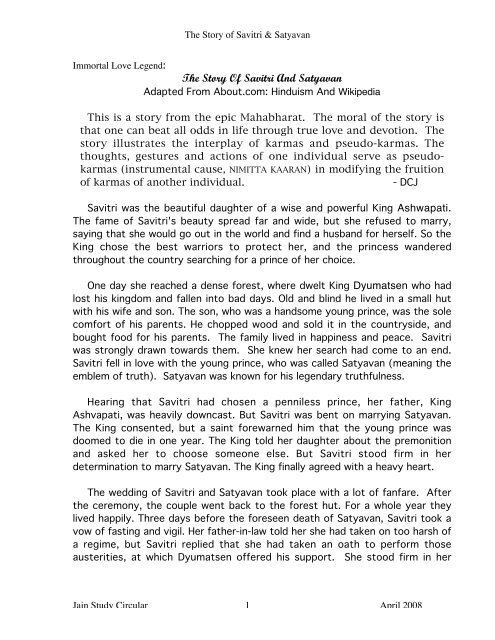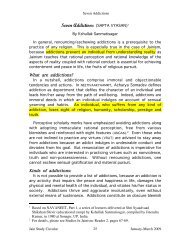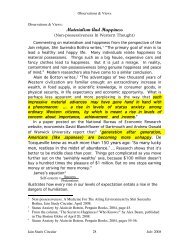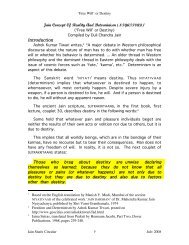The Story Of Savitri And Satyavan - The Jain Study Circle
The Story Of Savitri And Satyavan - The Jain Study Circle
The Story Of Savitri And Satyavan - The Jain Study Circle
Create successful ePaper yourself
Turn your PDF publications into a flip-book with our unique Google optimized e-Paper software.
<strong>The</strong> <strong>Story</strong> of <strong>Savitri</strong> & <strong>Satyavan</strong><br />
Immortal Love Legend:<br />
<strong>The</strong> <strong>Story</strong> <strong>Of</strong> <strong>Savitri</strong> <strong>And</strong> <strong>Satyavan</strong><br />
Adapted From About.com: Hinduism <strong>And</strong> Wikipedia<br />
This is a story from the epic Mahabharat. <strong>The</strong> moral of the story is<br />
that one can beat all odds in life through true love and devotion. <strong>The</strong><br />
story illustrates the interplay of karmas and pseudo-karmas. <strong>The</strong><br />
thoughts, gestures and actions of one individual serve as pseudokarmas<br />
(instrumental cause, NIMITTA KAARAN) in modifying the fruition<br />
of karmas of another individual. - DCJ<br />
<strong>Savitri</strong> was the beautiful daughter of a wise and powerful King Ashwapati.<br />
<strong>The</strong> fame of <strong>Savitri</strong>'s beauty spread far and wide, but she refused to marry,<br />
saying that she would go out in the world and find a husband for herself. So the<br />
King chose the best warriors to protect her, and the princess wandered<br />
throughout the country searching for a prince of her choice.<br />
One day she reached a dense forest, where dwelt King Dyumatsen who had<br />
lost his kingdom and fallen into bad days. Old and blind he lived in a small hut<br />
with his wife and son. <strong>The</strong> son, who was a handsome young prince, was the sole<br />
comfort of his parents. He chopped wood and sold it in the countryside, and<br />
bought food for his parents. <strong>The</strong> family lived in happiness and peace. <strong>Savitri</strong><br />
was strongly drawn towards them. She knew her search had come to an end.<br />
<strong>Savitri</strong> fell in love with the young prince, who was called <strong>Satyavan</strong> (meaning the<br />
emblem of truth). <strong>Satyavan</strong> was known for his legendary truthfulness.<br />
Hearing that <strong>Savitri</strong> had chosen a penniless prince, her father, King<br />
Ashvapati, was heavily downcast. But <strong>Savitri</strong> was bent on marrying <strong>Satyavan</strong>.<br />
<strong>The</strong> King consented, but a saint forewarned him that the young prince was<br />
doomed to die in one year. <strong>The</strong> King told her daughter about the premonition<br />
and asked her to choose someone else. But <strong>Savitri</strong> stood firm in her<br />
determination to marry <strong>Satyavan</strong>. <strong>The</strong> King finally agreed with a heavy heart.<br />
<strong>The</strong> wedding of <strong>Savitri</strong> and <strong>Satyavan</strong> took place with a lot of fanfare. After<br />
the ceremony, the couple went back to the forest hut. For a whole year they<br />
lived happily. Three days before the foreseen death of <strong>Satyavan</strong>, <strong>Savitri</strong> took a<br />
vow of fasting and vigil. Her father-in-law told her she had taken on too harsh of<br />
a regime, but <strong>Savitri</strong> replied that she had taken an oath to perform those<br />
austerities, at which Dyumatsen offered his support. She stood firm in her<br />
<strong>Jain</strong> <strong>Study</strong> Circular 1<br />
April 2008
<strong>The</strong> <strong>Story</strong> of <strong>Savitri</strong> & <strong>Satyavan</strong><br />
resolve and adhered to a higher spiritual commitment. Dyumatsen appreciated<br />
her determination.<br />
On the last day of the year, <strong>Savitri</strong> rose early and when <strong>Satyavan</strong> picked up<br />
his axe to go into the forest to chop wood, she requested him to take her<br />
along. <strong>The</strong> two went to the jungle.<br />
Under a tall tree, <strong>Satyavan</strong> made a seat of soft green leaves and plucked<br />
flowers for <strong>Savitri</strong> to weave into a garland while he chopped wood. Towards<br />
noon <strong>Satyavan</strong> felt a little tired, and after a while he came and lay down resting<br />
his head in <strong>Savitri</strong>'s lap. Suddenly the whole forest grew dark, and then <strong>Savitri</strong><br />
saw a tall figure standing before her. It was Yama, the God of Death. "I have<br />
come to take your husband," said Yama. He looked down at <strong>Satyavan</strong> as his<br />
soul left his body.<br />
When Yama was about to leave, <strong>Savitri</strong> ran after him, and pleaded with Yama<br />
to either take her along with him to the land of the dead or give back the life of<br />
<strong>Satyavan</strong>. Yama replied, "Your time has not yet come, child. Go back to your<br />
home." But <strong>Savitri</strong> insisted on accompanying her husband. Yama was impressed<br />
and agreed to grant her any boon, except <strong>Satyavan</strong>'s life. <strong>Savitri</strong> asked, "Let<br />
me have a wonderful son." "So be it", replied Yama. <strong>The</strong>n <strong>Savitri</strong> said, "But how<br />
can I have a son without my husband, <strong>Satyavan</strong>? <strong>The</strong>refore I beg of you to give<br />
back his life." Yama had to give in! <strong>Satyavan</strong>'s body came back to life. He slowly<br />
woke up from the stupor and the two gladly walked back to their hut.<br />
So strong was the single-minded love and determination of <strong>Savitri</strong> that she<br />
chose a noble young man for her husband, knowing that he had only a year to<br />
live. She married him with all confidence. Even the God of Death had to relent,<br />
and bowed to her love and devotion.<br />
Yama can be taken to be symbolic of a serious life-threatening<br />
disease and the wish for the birth of a son signifies optimism.<br />
<strong>Savitri</strong>’s entreaty represents the medical treatment coupled with her<br />
genuine devotion, conscientious care and dedicated service that<br />
resulted in the full recovery of <strong>Satyavan</strong>. <strong>The</strong> gestures and actions<br />
of <strong>Savitri</strong> served as pseudo-karmas in modifying the fruition of<br />
<strong>Satyavan</strong>’s karmas.<br />
<strong>Jain</strong> <strong>Study</strong> Circular 2<br />
April 2008












